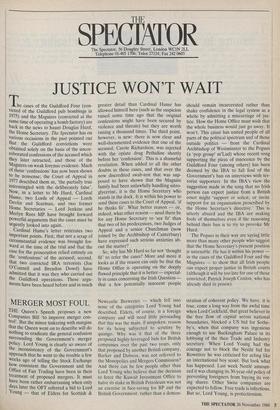SPECT TH 'AT OR
The Spectator, 56 Doughty Street, London WC1N 2LL Telephone 01-405 1706; Telex 27124; Fax 242 0603
JUSTICE WON'T WAIT
he cases of the Guildford Four (con- victed of the Guildford pub bombings in 1975) and the Maguires (convicted at the same time of operating a bomb factory) are back in the news to haunt Douglas Hurd, the Home Secretary. The Spectator has on various occasions in the past pointed out that the Guildford convictions were obtained solely on the basis of the Uncor- roborated confessions of the accused which they later retracted, and those of the Maguires on weak forensic evidence. Much of these 'confessions' has now been shown to be nonsense; the Court of Appeal in 1977 described them as, 'the partially true intermingled with the deliberately false'. Now, in a letter to Mr Hurd, Cardinal Hume, two Lords of Appeal — Lords Devlin and &carman, and two former Home, Secretaries — Lord Jenkins and Merlyn Rees MP have brought forward powerful arguments that the cases must be urgently looked into again..
Cardinal Hume's letter reiterates two important points. First, that not a scrap of circumstantial evidence was brought for- ward at the time Of the trial and that the case for the prosecution relied entirely on the 'confessions' of the accused; second, that two convicted IRA terrorists (Joe O'Connell and Brendon Dowd) have admitted that it was they who carried out the Guildford operations. These argu- ments have been heard before and in much greater detail than Cardinal Hume has allowed himself here (such as the suspicion raised some time ago that the original confessions might have been secured by violence and threats) but they are worth raising a thousand times. The third point, however, is new: there is now clear and well-documented evidence that one of the accused, Carole Richardson, was injected with the opiate drug Pethidine shortly before her 'confession'. This is a shameful revelation. When added to all the other doubts in these cases, and that over the now discredited swab-test that was sup- posed to have shown that the Maguire family had been unlawfully handling nitro- glycerine, it is the Home Secretary who stands in the dock. it k within his power to send these cases to the Court of Appeal, 'if he thinks fit'. What better reason — or indeed, what other reason — need there, be for any Home Secretary to 'see fit' than that two of his predecesSors, two Judges of Appeal and a senior Churchman (now joined by the Archbishop of Canterbury) have expressed such serious anxieties ab- out the matter?
So, why has Mr Hurd so far not 'thought fit' to refer the cases? More and more it looks as if the reason can only be that the Home Office is operating on the deeply flawed principle that it is better — especial- ly in cases concerning the Irish Question that a few potentially innocent people
should remain incarcerated rather than shake confidence in the legal system as a whole by admitting a miscarriage of jus- tice. How the Home Office must wish that the whole business would, just go away. It won't. This cause has united people of all parts of the political spectrum and of those outside politics — from the Cardinal Archbishop of Westminster to the Pogues (a 'pop group' m'Lud) whose recent song supporting the pleas of innocence by the Guildford Four (among others) has been deemed by the IBA to fall foul of the Government's ban on interviews with ter- rorist supporters. In the IBA's view the suggestion made in the song that no Irish person can expect justice from a British court might 'support or solicit, or invite support for an organisation proscribed by the Home Secretary's directive.' This is utterly absurd and the , IBA are making fools of themselves even if the reasoning behind their ban is to try to provoke Mr Hurd.
The Pogues in their way are saying little more than many other people who suggest that the Home Secretary's present position is untenable. He has it within his power in the cases of the Guildford Four and the Maguires — to show that all Irish people can expect proper justice in British courts (although it will be too late for one of those convicted, Patrick Joseph Conlon, who has already died in prison).










































































 Previous page
Previous page